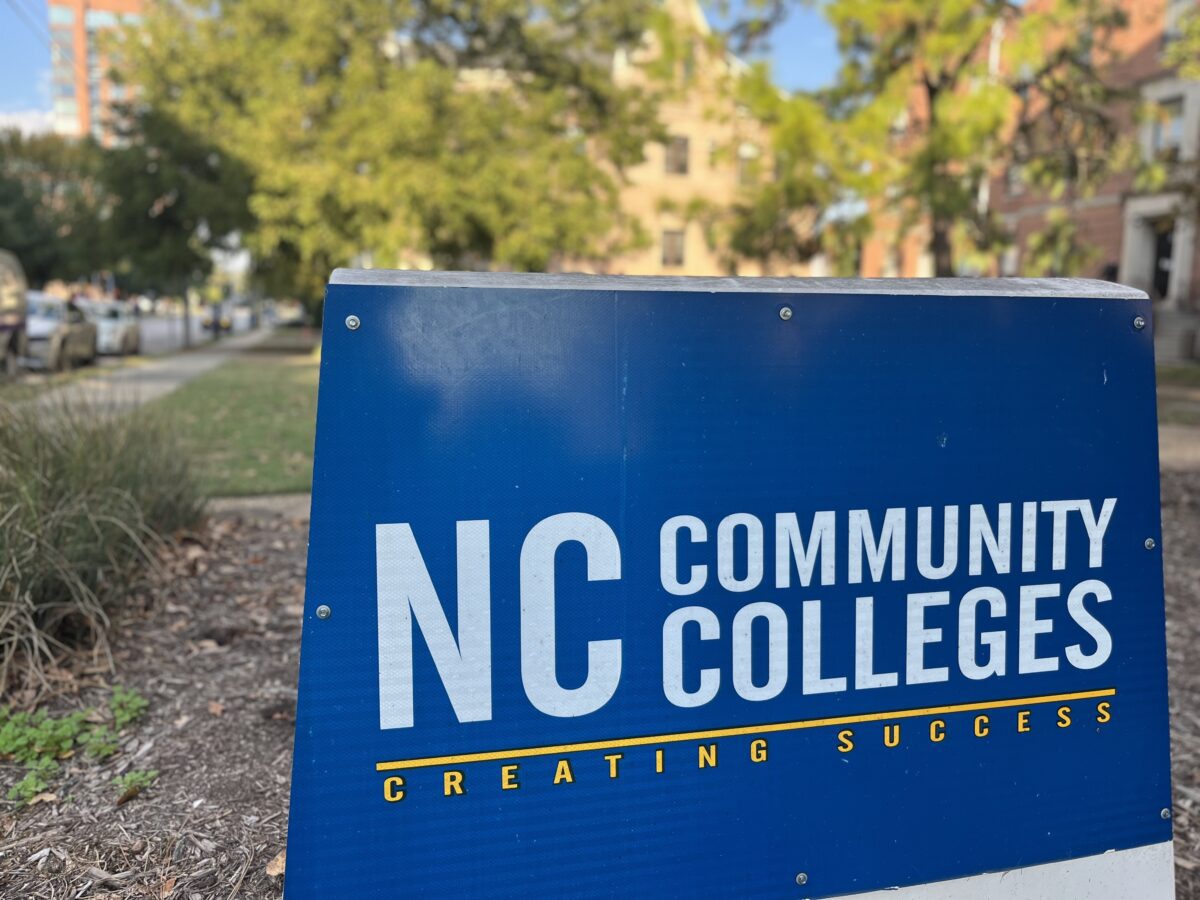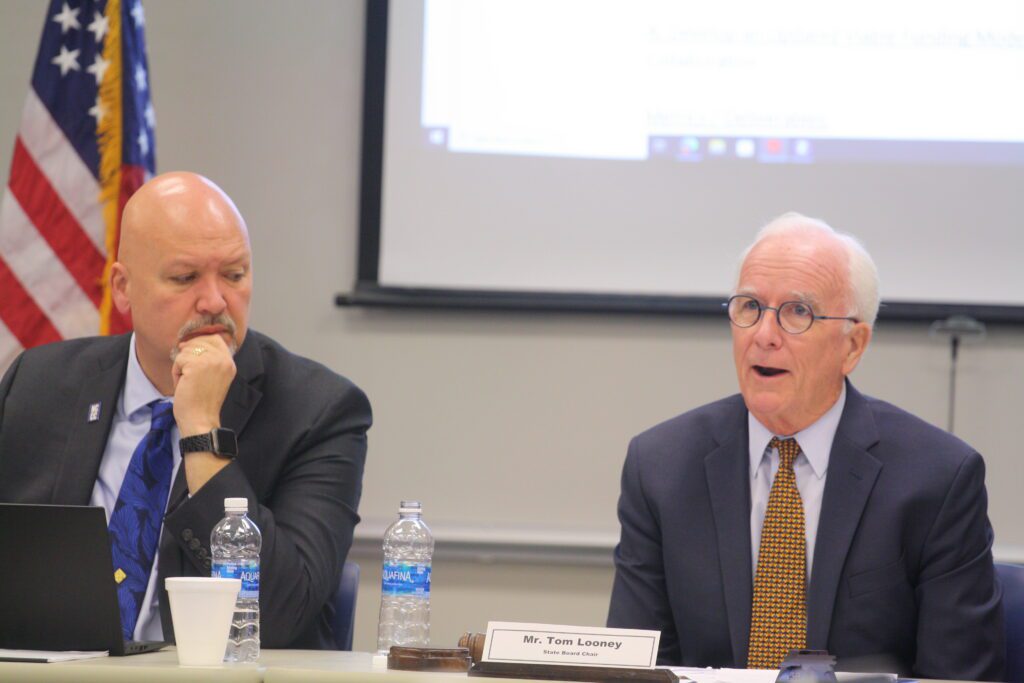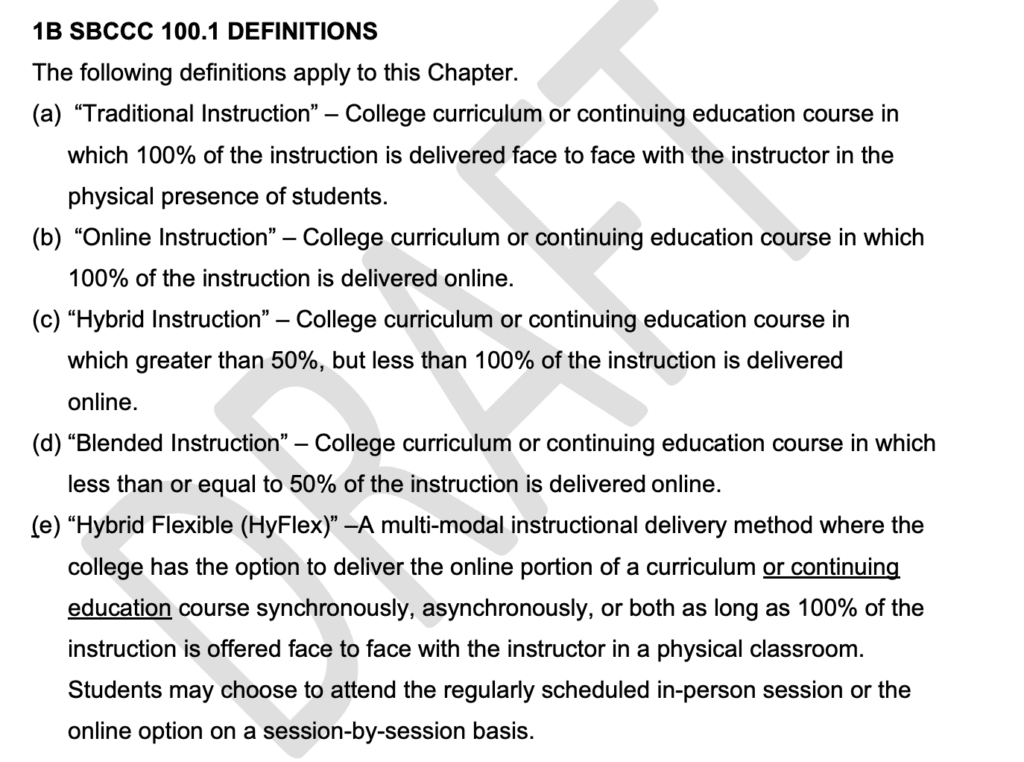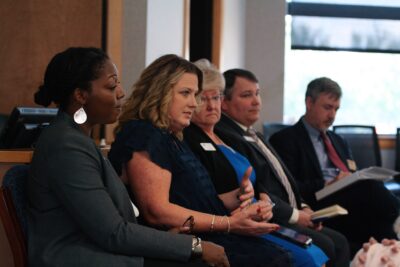
Share this story
- “This is a really good money budget for us, and we got a lot of what we asked for — not just what we asked for, but what we needed to do the work we do," said Blue Ridge Community College President Dr. Laura Leatherwood.
- The State Board of Community Colleges discussed the timeline for operationalizing items in the state budget for N.C. community colleges. The Board also heard about colleges' implementation of budget items, like accreditation and governance changes.
|
|
The State Board of Community Colleges reviewed state aid allocations and budget policies for the 2023-24 fiscal year at its meeting Oct. 20, discussing the timeline for operationalizing items in the new state budget for the N.C. Community College System (NCCCS).
The new state budget, passed on Sept. 22 and effective on Oct. 3, includes about $1.5 billion in both years of the spending plan for the NCCCS. The total includes a 7% raise over two years for most community college personnel, along with significant investments in student programs and individual college allocations.
“This is a very favorable budget for us,” NCCCS President Dr. Jeff Cox told the Board.
On Friday, the Board approved an initial budget allocation package that contained the 4% salary increase in 2023-24 and other employee benefit increases, funds for enrollment growth, and additional funds for basic skills and child care grants. In a separate item, the Board also approved allocations for up to $14.2 million to complete the rural broadband project.
You can find the budget allocation package in the 2023-24 state aid allocations and budget policies document.
In November, the Board is set to approve funding for faculty recruitment and retention, nursing faculty salary increases, and capital improvements, according to NCCCS Director of Government Relations Alex Fagg.
Blue Ridge Community College President Dr. Laura Leatherwood, also the president of the N.C. Association of Community College Presidents (NCACCP), said the presidents were particularly grateful for all the individual college allocations included in the budget.
The budget includes $100 million nonrecurring in each year of the biennium for new construction and repairs of facilities at nearly two-thirds of the state’s community colleges.
“On behalf of our 58 community college presidents and our colleges, we say thank you to our General Assembly members for the funding allotted to our colleges and for the raises for our employees,” Leatherwood said. “This is a really good money budget for us, and we got a lot of what we asked for — not just what we asked for, but what we needed to do the work we do.”
The system’s legislative ask was for $232 million, which included a 7% raise for faculty and staff over the biennium. While the budget does not include the flexible student investment fund of $145.88 million the system requested, it does include an unprecedented amount of allocations to individual colleges for workforce and health care programs.
The budget also allocates $30.5 million recurring each year based on the change in college enrollment, “which increased by 6,404 full-time equivalent students, or 2.9%, compared to the amount budgeted for FY 2022-23.”

Leatherwood highlighted a number of items from the budget that community colleges are working to operationalize.
- Accreditation provisions included in the budget, which require colleges and universities to change accreditors every 10 years. “We don’t know what that looks like yet and how we will navigate that,” Leatherwood said. The November Board meeting will include further discussion on these accreditation provisions, NCCCS staff said.
- Changes to local boards of trustees at each community college. The budget’s new selection process for local boards of trustees will now include eight trustees appointed by the General Assembly, and four trustees elected by the board of commissioners of the county in which the main campus of the college is located. The budget also outlines processes for boards of commissioners in other counties served by the college to appoint trustees.
- Impacts on community colleges from the “Parents’ Bill of Rights” legislation, which among other things, prohibits video and audio recording of minors without parental consent and requires schools to update parents on the preferred names of minors. Leatherwood said these requirements will impact community colleges, namely through dual enrollment and early college students.
- The provisions for early graduation laid out in the budget, which mandate that students be allowed to graduate in three years under a 22-hour track. Leatherwood said this could impact CCP enrollment at colleges.
- Other budget impacts include changes in multicampus funding and prohibitions against colleges and universities compelling political speech.
“Those are just a few of the things that we are navigating and operationalizing and worrying about on our campuses,” she said. “So we have a lot on our plates as presidents.”
In response to a question from a Board member, Leatherwood said colleges are also worried about the compression of pay between college leaders and nursing faculty, who are eligible to receive 10-15% additional raises, per the budget.
“If we give a 10-15% raise to nursing faculty, they might be making more than what the dean makes,” she said. “But I don’t think that concern says that we don’t need to do this.”
Leatherwood also highlighted work within the NCCCS to modernize the system’s funding formula. That work, which is a part of the system’s strategic plan, is being led by Richmond Community College President Dr. Dale McInnis and Lenoir Community College President Dr. Rusty Hunt.
The system has previously said it hopes to complete that work in order to present the changes to lawmakers at the short session, which typically begins in April. If the funding model were to be updated, it “would be a game changer for our community colleges,” Leatherwood said.
The Board will receive a presentation on the funding model redesign next month, Cox said at the meeting.
Bladen Community College President Dr. Amanda Lee commended the Board on their work during Friday morning’s moment of reflection.
“The decisions we are making in this room impact all the employees here at the system office, all the employees at every community college in the state, every student that graces our doors, and if I can be so bold, every family attached to that student,” she said. “I want to leave you with a blessing I ask for each of you, that you continue to have the wisdom to know the path forward and the courage to follow it.”

Governance and strategic planning
The Board discussed a number of governance items, continuing its work on implementing the system’s strategic plan.
The Board discussed metrics for the performance evaluation of Cox’s first year as system president, which outlines requirements for an end-of-year bonus. That document is expected to be approved at the November meeting.
The Board approved its Year 1 Goals for Cox at its September meeting. He has been serving in the role since June 1. Below is a list of those goals. The full list of goals is available in the Board’s meeting materials.
- Lead strategic plan initiatives to advance the N.C. Community College System, including: developing an updated funding model, scaling system capacity for workforce development, and creating a sustainability plan for rural colleges.
- Strengthen system office structure, leadership development, and culture and engagement.
- Engage Crucial Constituencies, including the General Assembly, Governor, education and workforce partners, and more.
- Oversee the continued development and execution of a comprehensive, statewide and national communications, marketing, and branding plan.
“These goals are ambitious in nature, (and) will not all be accomplished within a year but are critical to our long-term success,” the goals document says. “We will measure the President by ascertaining how well he leads the System Office and Community Colleges in making progress toward these goals over the next year.”
Each of the Board committees also reviewed their committee charters, which are expected to be approved next month. Board members also reviewed the Board’s bylaws, also set for a vote in November.
Finally, NCCCS Executive Director of Communications Nathan Hardin gave the Board a brief presentation on the new NCCCS website. That updated website will go live next month, shortly before the Board’s Nov. 16 meeting.
Board Chair Tom Looney thanked Hardin for all of his hard work on the project.
“I couldn’t be more excited about the visibility we’re going to get across our state and across the country with the work you’re doing,” Looney said.
Programs and personnel updates
As mentioned above, the Board approved allocations of up to $14.2 million to complete the rural broadband project. That project supports 47 of the state’s 58 community colleges.
The system has completed assessments for 45 of those 47 colleges. Those assessments identified the enhancements needed at those colleges. The $14.2 million figure includes those identified enhancements the system could not pay for, along with an estimate for the remaining two colleges in the project.
“We will continue to ask for funding to improve our rural college broadband,” said Patrick Fleming, NCCCS senior vice president and chief information officer.
The Board also gave final approval to its amendment regarding Hybrid Flexible (HyFlex) instruction. They first approved that definition in August, when a 30-day public comment period on the definition began. Last week, the Board approved the definition after it received no public comment.

The Board also approved two new positions within the system.
First, the Board approved Dr. Zach Barricklow, formerly at Wilkes Community College, for the new position of associate vice president for strategy and rural innovation. His salary will be $145,000. The position is currently grant-funded, with hopes of adding to the system budget moving forward.
That role will be based remotely in Wilkes and will involve travel to rural communities across the state “and help us engage in a much deeper way with our rural community colleges,” Cox said.
The Board also approved a position for a director of grants. That position will be grant funded for one year, with an approved salary range of $90,000 to $105,000.
“These two positions are going to be a huge support for Dr. Patrick Crane (NCCCS vice president of strategic initiatives) in this phase of implementing our strategic plan,” said Board Member Ann Whitford. “These two positions are really going to be a game changer for our strategic plan moving forward.”
Finally, Cox also recognized two new staff members in the system office: Delany Davis, associate legal counsel, and Veronica Watson, assistant human resources director.
Other items
- System office vacancies are down to 8.97%, with 213 out of 234 budgeted positions filled. Last year, that vacancy rate was consistently in the double digits.
- Tony Pile, the Board’s student member and president of the North Carolina Comprehensive College Student Government Association (N4CSGA), said N4CSGA is advocating for a system-wide Student Mental Health Week, including a non-instruction day during that week. Many of the state’s community colleges are working to bolster their mental health resources.
- Chair Looney told Pile the Board will be working to offer more support to the NCCCS student government moving forward.
- The Board met in closed session to discuss an audit item, which it did not discuss once back in open session.
- The Board received a presentation on ApprenticeshipNC, a NCCCS program that certifies apprenticeships across the state. One of the tactics for Year 1 of the strategic plan is to expand the number of the state’s apprenticeships. Several Board members highlighted and praised ApprenticeshipNC’s presence at the North Carolina State Fair last week.
- There are three openings on the Board, including two expiring terms and one vacancy. Looney said those positions should be filled by next month’s meeting.
The next Board meeting is scheduled for Nov. 16-17 in Raleigh.





